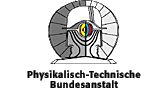Allgemeines
Physikalisch-Technische
Bundesanstalt

http://www.ptb.de/
Grundlagen
der Physik
Die Grundfragen der Physik haben sich seit ihrer Entstehung nur
wenig gewandelt: Aus welchem „Stoff" besteht die Welt, und
nach welchen Gesetzen bewegt sie sich?
Die
Physik beschäftigt sich mit dem Versuch, die Vorgänge in der Natur
zu erfassen, zu beschreiben, zu ordnen und letztlich zu verstehen.
Von „Verständnis" kann gesprochen werden, wenn es gelingt,
eine Vielzahl von Phänomenen mit einer vergleichsweise einfachen
Theorie (griechisch theorein: schauen) zu erfassen. In der
modernen Physik bemüht man sich, für die Grundbausteine der Materie
und deren Wechselwirkungen eine angemessene mathematische Beschreibung
zu finden, in der sich das „reale" Verhalten widerspiegelt.
Von vielen angestrebt – aber bisher unerreicht – ist eine einzige,
umfassende und einheitliche Theorie.
http://www.asamnet.de/~kistnerm/technik/physik/index.htm
Anfängerpraktikum
Physik
Homepage des Physikpraktikums für Anfänger am Physikalischen Institut
der Universität Basel. Zu jedem der rund 80 Experimente im Anfängerpraktikum
ist eine kurze Versuchsbeschreibung im Web zu finden. Zudem
besteht die Möglichkeit, sich die Versuchsanleitung am Bildschirm
anzusehen bzw. auszudrucken.
http://www.unibas.ch/phys-ap/
Multimedia
Physik
Peter Krahmer - krahmer@t-online.de
http://www.wuerzburg.de/mm-physik/homep.html
The Poetry of Physics
Robert K. Logan - logan@physics
The alienation of the
lay public from science is a characteristic of our times. This alienation
is represented by the gap between the sciences and the humanities
frequently referred to as the two cultures. There are two factors
contributing to this alienation; one is the basic lack of understanding
of the actual subject matter of science and the other a misunderstanding
of the role science plays ion our society.
This book attempts to remedy this classical situation by communicating
the ideas of physics to the reader without relying on mathematics.
This book is written explicitly for the people who have difficulty
with the mathematics but wish to understand their physical universe. A second aim of the book
is to understand the nature of science and the role it plays in
shaping both our thinking and the structure of our society. Finally,
I hope that through this book I will be able to share with the reader
the mystical feelings that once characterized our response to our
physical environment. Unfortunately, there has arisen in many people's
minds a division between the mystical and the scientific. For those
in tune with their universe there is no division. In fact quite
the opposite is true as these words of Albert Einstein reveal:
The most beautiful and most profound emotion
we can experience is the sensation of the mystical. It is the
power of all true science. He to whom this emotion is a stranger,
who can no longer stand, rapt in awe, is as good as dead. That
deeply emotional conviction of the presence of a superior reasoning
power, which is revealed in the incomprehensible universe, forms
my idea of God.
Hopefully, the beauty
of the concepts of physics will be conveyed so that the reader will
come to appreciate the poetry of physics.
http://faraday.physics.utoronto.ca/JPU200Y/RKLogan/FrontPage.html
Usenet
Physics FAQ
Scott I. Chase - sichase@ccnet.com
This is the web version of the Usenet Physics FAQ (Frequently Asked
Questions). Its purpose is to provide good answers to questions
which have been discussed often in sci.physics and related usenet
newsgroups. The articles in this FAQ are based on those discussions
and on information from good reference sources.
Index of Subjects
Administrivia and Reference
General Physics
Particle and Nuclear Physics
|
Quantum Physics
Relativity and Cosmology
Relativity and Cosmology questions are answered in the
Relativity
FAQ
Related FAQs
There are many other places where you may find answers
to your question. This is a list of other FAQs and answer
archives which are related to physics.
|
http://math.ucr.edu/home/baez/physics/faq.html
Introductory Physics - Table of Contents
Ian Burley, Meg Carrington, Randy Kobes, Gabor Kunstatter
These notes constitute a general, non-calculus introductory
physics course. They are based on lectures given through the IUN/FYDE
distance education program of the University of Winnipeg, which provides access
to university level courses for communities outside of Winnipeg.
The material covered comprises the introductory course Physics 1301 offered at the University.
This index can be searched
by keywords.
Comments, corrections,
and suggestions are welcome to any of the authors.
http://theory.uwinnipeg.ca/physics/index.html
 physik.de physik.de
Aktuelle Nachrichten aus dem Bereich der Physik.
http://www.physik.de/
American Institute
of Physics - Physics Information NetSite
Umfangreiche Informationen zu aktuellen Themen aus
der Physik. History Center zu Themen aus der Geschichte der Physik.
Online-Publikationen. Text- und Bildarchive ...
http://www.aip.org/
Physik
Eine umfangreiche Linksammlung bei Bellnet.
http://www.bellnet.com/suchen/bildung/science/physik.htm
Dave Slaven's Home Page!
Dave Slaven
Here in Dave's
Physics Shack, you can learn about a number of different topics
in physics. Select from any of these websites:
The
Page of Entropy
Dave's
Relativity Page
The
Page of Uncertainty
Dave's
Microcosmos
The
Atom
Or for something not
quite as educational, see the quorbit
page. Dave's Physics Shack is also host to a page on general
relativity by Nymbus.
http://webs.morningside.edu/slaven/Physics/index.html
Physics 2000
Physics 2000 relies heavily on the use of interactive
"applets". These are different from the typical animations
you see on the Internet because you can actually interact with them.
What are the goals of the Physics2000 Educational
Initiative?
- To make physics more accessible to students
and people of all ages and to counter its current negative image.
- by developing an innovative Internet
Website, aimed at all ages, emphasizing imagery, interactivity
and hierarchical organization.
- by developing live classroom courses
for undergraduate non-science majors with unconventional topical
organization and web support.
- To demonstrate the connection between
modern technology and earlier basic research.
- by working backwards from familiar
current devices and technologies to general principles established
much earlier by basic experiment and theory.
- To foster an appreciation of the accomplishments
of 20th century physics, as we approach the year 2000.
- by focusing public attention on current
research achievements in physics and explaining their significance.
- by developing new inderdisciplinary
and cross-topical undergraduate courses for both majors and
non-majors.
http://www.colorado.edu/physics/2000/index.pl?Type=TOC
Physics 361
michael_gosselin@fc.wtvl.k12.me.us
A College Preparatory Course Delivered On-line to
Students at Waterville High School, Waterville Me.
http://www.wtvl.k12.me.us/wshs/physics361/intro/index.html
Caroline
Thompson's Physics
Caroline Thompson - cat@aber.ac.uk
This site is about what is wrong with Fundamental Physics.
It started with the discovery that we have been misled. We have
been told that experiments agree with all the predictions
of quantum theory, including those that involve the impossible -
the EPR (Einstein-Podolsky-Rosen)
experiments, that are supposed to show totally incomprehensible
effects of separated particles on each other. I have looked at the
evidence. The "loopholes" that they know are present are
large enough to allow for perfectly straightforward explanations,
with no sign of "non-locality". I am led to suggest that
perhaps there is other currently-accepted "evidence" for
both quantum theory and Einstein's relativity theories that needs
re-investigation. (There is! See Forgotten
History .) I am not talking of "re-interpretation",
but of recognising that if we want to understand nature,
not just produce "predictions", the first step is to re-assess
the facts, reject falsehoods.
http://users.aber.ac.uk/cat/ |




